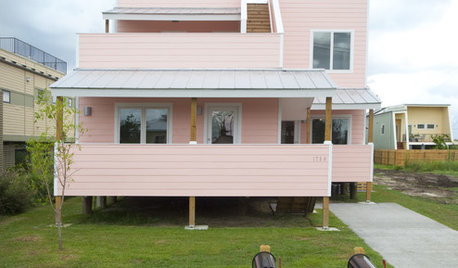Thanks to Katrina...
youreit
17 years ago
Related Stories

LIFEThank U 4 the Gr8 Gift: How to Send Thanks in the Digital Age
We click open invitations and RSVP via text, but a handwritten thank-you is sometimes still best. Here's how to tell
Full Story
HOUZZ TOURSMy Houzz: From Destruction to Renewal After Hurricane Katrina
After losing almost everything home related, a couple rebounds with a new, contemporary build on the same site
Full Story
CONTEMPORARY HOMESFrank Gehry Helps 'Make It Right' in New Orleans
Hurricane Katrina survivors get a colorful, environmentally friendly duplex, courtesy of a starchitect and a star
Full Story
HOUZZ TOURSMy Houzz: Newly Sustainable in New Orleans
Energy-efficient and recycled materials plus an elevated perch give a post-Katrina Louisiana home a great new start
Full Story
ORGANIZINGChecklists for a Well-Stocked Home
Thank-you notes, first-aid kit, clear glass vases ... It’s easy to go with the flow when you’ve got the items you need at hand
Full Story
TRAVEL BY DESIGNTravel Guide: New Orleans for Design Lovers
Experience the city's energetic rebirth layered with centuries of history, seen in its architecture, museums, restaurants and more
Full Story
HOUZZ TOURSMy Houzz: African Art and Midcentury Style in a Louisiana Home
Global mementos and classic modern furnishings come together in a couple’s one-of-a-kind home and artist’s studio-residence
Full Story
HOUZZ TOURSMy Houzz: Luminous and Low Maintenance in New Orleans
See the new build that replaced a hurricane-ravaged house, beginning a new chapter for a retiring couple
Full Story
COLORDreaming in Color: 8 Gorgeous Gray Bedrooms
With this versatile hue, you can go dark and bold or slip into something more soothing
Full Story
COMMUNITYSimple Acts: The Unsung Power of a Good Neighbor
There are many ways to be a good neighbor, and they're often easier than you think
Full Story





sheepco
semper_fi
Related Discussions
can I plant after mildew squash?
Q
Louisiana Sunrise
Q
Hello! New to forum from Evansville, IN
Q
What is a lasagna garden
Q
ademink
youreitOriginal Author
semper_fi
youreitOriginal Author
sheepco